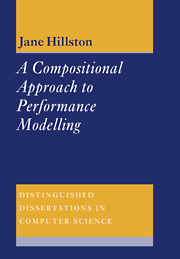Book contents
4 - Modelling Study: Multi-Server Multi-Queue Systems
Published online by Cambridge University Press: 24 November 2009
Summary
Introduction
In this chapter we present a modelling study demonstrating the use of PEPA for performance evaluation. Examples drawn from the modelling study will be used to exhibit the model simplification techniques developed later in the thesis. This study considers and compares various multi-server multi-queue systems. Such systems, an extension of the traditional polling system, have been used to model applications in which multiple resources are shared among several users, possibly with differing requirements. Examples include local area networks with multiple tokens, and multibus interconnection networks in distributed systems. Similar systems have been investigated in [26, 84, 85, 86, 87, 88].
A polling system consists of several queues and a single server which moves round the queues in cyclic order. These systems have been found to be good models of many systems which arise in computer network and communication scenarios, and consequently they have been extensively studied. A recent survey by Takagi [89] references over four hundred contributions.
A variety of extensions and modifications to the traditional polling system have been investigated [89], including non-cyclic polling, priority queues, and queues with feedback. One extension which is particularly suited to modelling innovative local area networks is the introduction of additional servers, each of which moves around the queues providing service where it is needed. These systems, sometimes known as multi-server multi-queue systems, are not readily amenable to queueing theory solution. Several suggested approximation techniques, based on queueing theory, and exact solutions based on GSPNs are reviewed in Section 4.3.1.
Information
- Type
- Chapter
- Information
- A Compositional Approach to Performance Modelling , pp. 45 - 64Publisher: Cambridge University PressPrint publication year: 1996
